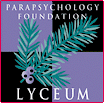 |
 |
| by Sergio Schilling Universidad Internacional SEK, Santiago, Chile The 2004 Robert R. Coly Prize Winning Essay “We must go on …” These are said to have been the last words of the great J. B. Rhine, master, visionary, and father of “parapsychology.” What leads a man to pronounce these words when he is on his deathbed? Perhaps some feelings or ideas. I believe quite a lot can be learned from it. On one hand, the strong feeling that his work had not been finished. We are quite aware of Rhine’s efforts to generate conditions that would allow psi to act repeatedly and under controlled conditions, thus giving this discipline a safe place and respectability within scientific communities. A purpose and a contribution can be seen in our way of looking at the universe and at ourselves. Rhine had a dream, a hope, a legacy for history. The hope that the method was the right one and that it was worthwhile to go forward. What would psi be? A contribution to our lives? Or, what is the revelation, the hope that parapsychology contributes? It seems that parapsychology opens a gate to a renewed and wider comprehension of nature, starting from our own thinking of how reality is going through our day-to-day interaction with it and with our fellow creatures. Psi confronts us with an epistemological change, a change of the idea of the dissociation of subject from object, so successfully expoused by Descartes, an idea that has promoted plenty of scientific developments over the last 300 years … It is widely known that the “reality model” submitted by the founders of quantum theory brings new light on microcosmic behavior, reformulating physical theory. A change implying a different comprehension of the observer’s conscious functioning in the construction of matter, in its influence on molecular behavior. The subject infuses himself into each thing that is discovered and absorbed. In a certain way, everything the subject is able to perceive is nothing but a reflection of himself under multiple colors, mirroring multiple shades. So, while investigations go deeper into what this means for observation and measurement, we, paradoxically, also go deeper by discovering ourselves. Parapsychology looks for understanding, for a way to order this subtle and narrow relationship between psyche and matter through the countless links between the microcosm and our individual and collective experience and beyond — provided it is understood that psyche and matter are nominal terms only, denoting a simplified and artificial separation of something that is intrinsically a continuum. Thus we have the notion that this is an activity shared by specialists of different areas, among them physicians, biologists, anthropologists and many others, who interchange their ideas and communicate by means of a transversal language, one that looks at psi as a means to understand the complete nature of reality. Even more than in any other scientific activity of the present day, transdiscipilnary intercommunication is fundamental to dealing with the subject. These characteristics furnish parapsychology with the purpose of restating frames of reference with respect to our interaction with and understanding of the world, not only from the theoretical notion of paradigm change, but from a pragmatic change in the interactions among ourselves, with society and with nature. If psi should exist, we are also faced with, as is society in general, the necessity of assuming a more committed and responsible relationship to and with others, given the fact that we are interconnected with each other in a constitutive way, and even more because our ideas and intentions and those of others are mutually interactive, forcing us to contemplate the possiblity that our role is that of a custodian, not only of our environment but of our friends, our colleagues and our families as well. So we have that word “will” and it has a profound and fundamental meaning for the parapsychologist. It is a transformative process, an engine of change in our environment, and thus a chance to obtain the best opportunities. Likewise the word “expectation” becomes considerably more important because now we must be aware of our own values and beliefs when the time to investigate arrives. Parapsychology presents the challenge that it is time to reconsider policies and the way we gather and view the facts we have been using these last hundreds of years. Parapsychology gives us new insights into such notions as “good” and “evil”, into the need to become more aware of how our behavior influences others, and of the subtle but deep ties that connect everything around us. Psi confronts us with the necessity to destroy individualistic behavior, turning us towards cooperation and commitment. The idea that we must “love and respect each other” finds a new significance when seen from a parapsychological point of view. Parapsychologists have to struggle to generate new strategies of social interaction to promote acceptance and survival across the generations. In order to obtain this objective, the challenge is to succeed in “reaching people” through mass media, to promote a social consciousness of the importance of psi research for their own lives, as well as to communicate the strict methods of investigation being used. Most people are more familiar with mediums, with horoscopes or tarot cards than with the concepts of psi, ESP or PK. And parapsychology is not widely accepted among our conventional scientific colleagues. We have not attained institutional maturity, evident in the very small membership of the Parapsychological Association as compared to the average size of most other international scientific societies. Without general audiences and without specialists, it is difficult to gain access to the principal incentive for social advance: money. Most unfortunately without funding, the sweetest reveries are only a chimera. Whereas, on the contrary, adequate funding can make sure that the most brilliant initiatives flourish. Scientists, similar to artists, badly need mighty patrons to finance their creative impulses. To create, a full stomach is a must, and in this respect, with only a few exceptions (such as the Bial Foundation), our interests do not fit with those of the principal funding sources on the planet. Academics who want to investigate psi must abandon their pursuits, or turn their attention to more profitable areas. Psi must be useful if it is to gain a place. If we want to highlight parapsychology’s potential as an agency of social transformation and at the same time understanding that as a discipline it is a minor academic group, we must draw from the example of many minorities before us who have fomented much social change. Feminism, Fascism, Utopian movements of the late 19th-century, Communism, consumer protection movements and so on. All of them prove that small well-organized groups with firm beliefs can generate unexpected changes in societies whether they are constructive or disastrous. It is enough to imagine what would happen if it were possible, even partially, to develop a commercial application for psi. Such a development would generate dynamic processes of thinking, changes in philosophies and beliefs, and in the manner in which culture is generated. There would be a tremendous impact to humankind, such as that which followed on the invention of the wheel. Psi could (and should) be the cause of such a radical change. I believe there is hope that we may participate in this shift. And I believe that Rhine’s words are as strong now as they were then: “We must go on!” To read a brief biography of Sergio Schilling, go to the “Previous Recipients” page of the Coly Prize section of the main Foundation website. To go to the Index of Archived Essays, click here. |
 |

|
 www. parapsychology. org |
||